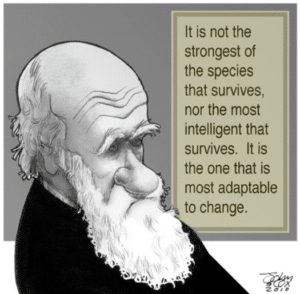Survival of the Fittest
The market rally that began in March continues its historic run. In stark contrast with what is happening on Main Street, Wall Street has performed exceptionally well, with the S&P 500 posting its best two consecutive quarters in the last 20 years! That incredible performance has not been uniform across all market segments; value stocks in particular have not kept up with growth stocks and lag by over 36% in just the last 9 months – the largest delta since 1979.[1] The economy, while improving from the bottom, is still far from normalized output levels. Not surprisingly, investors have responded by shunning businesses such as banks, energy companies, airlines, and others that similarly rely on an improving economy. Investors have instead paid up for businesses that grow irrespective of the general economy as growth is so hard to come by for many companies.
This lack of growth in the economy and companies has resulted in interest rates stuck at historically low levels with no expectation of them rising in the near future. In fact, at its last meeting, the Federal Reserve signaled it will keep short term rates low for years, and a number of members indicated rates will likely be anchored near zero through 2023. Given the fragile economy, the central bank understands its primary function at this point is to maintain liquidity in the markets. Bonds have generated admirable returns with the long-term decline in interest rates (bond prices go up when interest rates go down and bond prices go down when interest rates go up). Given that the Fed has said it will not take rates below zero, going forward capital gains in bonds will be hard to come by and the total return will likely be limited to the interest payments bonds distribute. Given this backdrop of near-zero rates and scarce growth for corporations, we think equities could remain at historically high valuations with fewer and fewer places to generate real positive yields.
Generally, strong areas of the market do not maintain leadership forever. We expect (and hope) that driven by better virus metrics come next spring and summer, the weaker sectors may find a way to catch up. The airline sector has been decimated with travel down over 67% from last year’s levels. It is interesting to view the transfer of shareholder wealth that occurred over this time. Since the pandemic began, the public equity value of the largest US airlines has dropped by over $50 billion and the two largest US hotel chains have lost $25 billion in value. Zoom Communications has emerged victorious, having gained over $100 billion in value as those business travelers who flew and slept in hotels now conduct meetings from the confines of their own homes! One could argue that net-net, the value merely transferred from the real-life analog world, to the digital. That is one of the reasons the market has done so well, as the largest stocks in the market are now all beneficiaries of the evolution to exponentially more time spent in the digital world.
Only the Strong Survive.
The illustration below appears to credit Charles Darwin with the quote “It is not the strongest species that survives, nor the most intelligent that survives. It is the one that is most adaptable to change.” Although widely attributed to Darwin – and as such is inscribed on the floor of the California Academy of Sciences – the quote is actually from Leon Megginson, a business professor at LSU in 1963. Megginson was a social scientist who believed in the power of change and asserted that businesses that recognize, embrace and adapt to change have a better chance at success in the long term.

Today, the S&P 500 is dominated by technology companies because that is where value has been created. The most successful companies are the ones who not only recognized the coming changes but also those who reacted quickly. Of the top ten companies in the market today, none were in the top ten in 1980 and 1990. Only Microsoft was in the top ten in 2000 and just four were in the top ten in 2010 – Microsoft, Berkshire Hathaway, Google and Apple. A deeper dive into these four companies will likely confirm Megginson’s theory that deliberate and constant reactions to our changing world are essential to long-term success. Like companies themselves, we as investors MUST accept and embrace change because it is constantly occurring.
The same theory applies to us as individuals. From decreasing our reliance on fossil fuels to enacting stricter building codes to combat the effects of a world where natural disasters are more frequent and powerful, embracing change can prove to be key to both short-term and long-term survival. Even on a micro level, so many of us not accustomed to the idea initially shuddered at the thought of having to wear a mask in public. However, to reject the idea leaves many of us vulnerable to the disease so we adapt and don the masks.
The COVID Pandemic has accelerated change that was already occurring at breakneck speed. Some changes will stay with us and others won’t, and all companies are forced to adapt and evolve. [LP4] Those companies that do so will be deemed the most “fit” and survive.
The election, less than a month away, could bring about tremendous change, or things could remain status quo. While we are (thankfully) not in the business of predicting election outcomes, we know that the market, like you, takes great interest in who will win. It is our belief, based on data, that the market’s immediate reaction to the election is a short-term response and over the long term will not be impacted to any great degree by who is in the White House.[2] Markets have done well under both Republican and Democratic leadership and we expect that the performance over the next decade will prove to be no different.
Again, we hope that you, your friends and family are holding up and doing well, all things considered. Please reach out to us if there is anything we can do to help.
All the best,
| Adam | Greg | Matt |
DISCLAIMER: Past performance is not indicative of future results. The securities identified and described do not represent all of the securities purchased, sold or recommended for client accounts. The reader should not assume that an investment in the securities identified was or will be profitable.
RIVERWATER SMID STRATEGY
The SMID strategy had positive returns in the quarter and outperformed its benchmark. Given our style of investing we expect to keep pace with the market when up and protect to the downside when down. We are happy to have done both as the market dropped in the first quarter and then came roaring back in the second and third.
We have done this with no major changes in the portfolio makeup over the last nine months. Which brings us to our continual consideration of when and if we should become more aggressive and oriented to a more “back to normal” environment where people feel comfortable congregating again. We think the earliest normalcy could return is at best next summer, but we need to be cognizant that the market usually figures things out at least six months in advance.
This quarter we bought two new companies and trimmed one position. Charles River Labs grew to an outsized weighting (it is up +75% over the last year) and so we trimmed our position. We took those proceeds and started a position in Quidel (QDEL).
Quidel is a leader in the development, manufacturing, and marketing of rapid diagnostic testing solutions. Their products aid in the detection of critical diseases and medical conditions, including infectious diseases, cardiovascular diseases, and women’s health, to name a few. Products are sold for use in physician offices, hospitals, clinical laboratories, urgent care clinics, and pharmacies. Quidel has consistently grown revenue at 10% per year historically; today, we believe several opportunities – further expansion of testing beyond influenza, the launch of the new Savannah testing device, and FDA Emergency Use Authorization (EUA) for their COVID test – will accelerate that growth rate over the next several years. The stock is attractively valued as it trades at a below market multiple with above average growth.
We had been following the company and took advantage of an irrational selloff caused by the news of Abbott’s 15-minute test. We were happy to see the CEO follow our buy with an open market purchase and since then the stock recovered most of the loss from the news.
We also took a bold step and added a new position in SVB Financial (SIVB). Banks have been hit hard as interest rates plummeted and credit issues are likely to ramp as businesses deal with widespread closures. Nonetheless, we felt comfortable given SVB’s strong balance sheet and lower reliance on interest income due to a large percentage of earnings coming from fee-based revenues. SVB also has significant exposure to the technology sector which has insulated them from credit issues. Additionally, the stock’s valuation is at the low end of its historical range. Finally, we were attracted to the ESG efforts the bank has taken which we believe are way ahead of their industry competitors. The bank has made it a priority to focus on diversity and inclusion. It has set goals to achieve gender parity by 2030 and has been one of less than ten US banks to be included in the Bloomberg Gender Equality Index.
RIVERWATER LEI STRATEGY
On an absolute basis, our Large strategy had positive returns, and also outperformed its benchmark. We were not terribly active again in the quarter with just one sale and one trim. Year-to-date we have added only four new positions and three of those were in the month of March amongst the market mayhem. We are running slightly higher levels of cash as we have not yet reinvested the proceeds from the sales of FirstEnergy (FE) and a trim of American Electric Power (AEP).
On July 21, FirstEnergy received subpoenas in connection with an investigation surrounding a utility Bill passed by the Ohio House legislature. Allegedly, Ohio House Speaker, Rep. Larry Householder, and several politicians were directly tied to First Energy and paid tens of millions of dollars to pass the utility Bill. The alleged bribery case gave us significant concern regarding their governance practices and violated our internal ESG guidelines. Shortly after learning of the subpoena in the morning (all the facts were not yet known), we sold our entire position in First Energy. A press conference was held later in the day and the stock promptly gapped down to levels below where we sold.
On July, 27th, it was alleged that American Electric Power was also involved in the bribery investigation through an AEP, solely sourced, non-profit. Later the same day, AEP proved to have no involvement in the bribery. During these few hours of uncertainty, we again decided to reduce our exposure and trimmed our position in half.
On a more positive note we had our first takeout of the year as Analog Devices (ADI) announced its intention to acquire Maxim Integrated Products (MXIM). Maxim shareholders will receive .63 shares of ADI for each Maxim share. We started a small position in Maxim close to three years ago and doubled down on it this past March. Thankfully, the takeout price is over 38% higher than what we paid just a few months ago. We are comfortable holding the shares for now but are currently looking into potential replacements.
DISCLAIMER: Past performance is not indicative of future results. The securities identified and described do not represent all of the securities purchased, sold or recommended for client accounts. The reader should not assume that an investment in the securities identified was or will be profitable.
[1] https://markets.businessinsider.com/news/stocks/stock-market-outlook-growth-driving-market-value-bounce-bofa-strategy-2020-10-1029646337#
[2] https://www.cnn.com/2020/09/23/investing/stock-market-election-trump-biden/index.html








